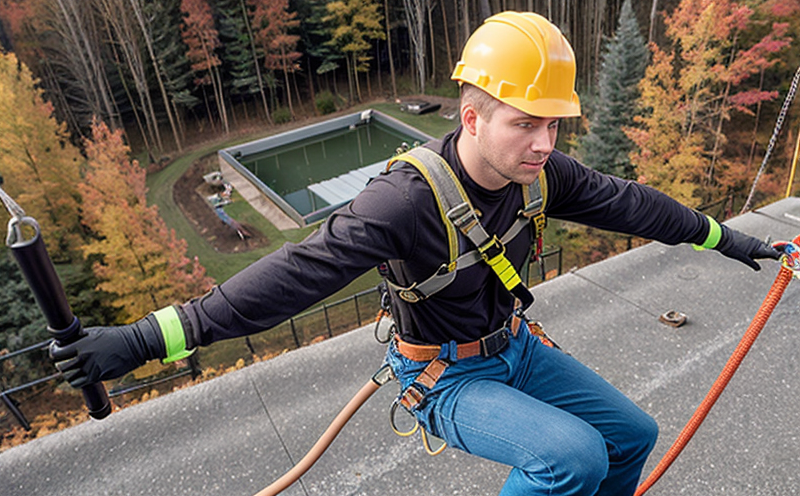ANSI Z359.4 Rescue System Load Testing
The ANSI Z359.4 standard provides guidelines and requirements for rescue system components used in fall protection systems, which are critical to occupational safety within high-risk industries. This service focuses on the load testing of these rescue systems as per the ANSI Z359.4 standard. The testing ensures that rescue systems can withstand the maximum potential loads they might encounter during use.
Load testing is a crucial step in verifying the integrity and reliability of fall protection systems, particularly those designed to save lives in case of accidental falls. This service involves subjecting the rescue system to controlled loads that simulate real-world conditions, ensuring it performs as expected under stress. The test parameters include static load, dynamic load (impact loading), and cyclic loading.
During the static load testing, the system is subjected to a predetermined maximum load for an extended period to ensure there are no structural failures or deformations. Dynamic load testing simulates sudden impacts that might occur during a fall, ensuring the system can absorb these forces without failure. Cyclic loading tests the system’s durability by subjecting it to repeated stress cycles until fatigue-induced failures are detected.
For accurate and reliable results, proper specimen preparation is essential. This includes ensuring that all components of the rescue system are assembled correctly according to manufacturer specifications, and that any necessary instrumentation is calibrated beforehand. The testing apparatus typically consists of a load frame capable of applying controlled loads and measuring forces accurately. Load cells and strain gauges may be used for precise force measurement.
The acceptance criteria for ANSI Z359.4 compliance include the system passing all static, dynamic, and cyclic loading tests without structural failure or significant deformation. The results are recorded in a detailed report that includes load values, test duration, and any observations made during testing. This documentation is crucial for ensuring regulatory compliance and providing evidence of the system's reliability.
Quality managers, compliance officers, and R&D engineers benefit significantly from this service. Compliance officers ensure their organization meets all regulatory requirements, while quality managers can verify that their products meet the highest standards of safety and performance. R&D engineers use this testing to refine designs and improve product performance continually.
Eurolab Advantages
Eurolab offers unparalleled expertise in ANSI Z359.4 rescue system load testing, providing comprehensive services that meet the highest industry standards. Our state-of-the-art facilities and experienced team ensure accurate and reliable test results every time.
- Accurate Testing Equipment: We use cutting-edge equipment to apply controlled loads with precision, ensuring consistent and repeatable test results.
- Comprehensive Reporting: Our detailed reports provide a comprehensive overview of the testing process and outcomes, offering valuable insights for your quality assurance program.
- Regulatory Compliance: Eurolab ensures that all tests comply with ANSI Z359.4 standards, providing peace of mind regarding regulatory compliance.
- Dedicated Customer Support: Our team is available to answer any questions and provide support throughout the testing process, ensuring a smooth experience for our clients.
With Eurolab, you can trust that your rescue systems are thoroughly tested and verified to meet rigorous standards. Whether you need routine testing or certification of new products, we have the expertise and resources to meet your needs.
Competitive Advantage and Market Impact
Earning ANSI Z359.4 compliance through Eurolab’s rescue system load testing service offers significant competitive advantages in the occupational safety market. Regulatory bodies increasingly require organizations to demonstrate compliance with these standards, making it imperative for companies to ensure their products meet these requirements.
By obtaining this certification, your organization can:
- Gain Customer Trust: Demonstrating compliance with ANSI Z359.4 instills confidence in customers and stakeholders, enhancing brand reputation.
- Avoid Legal Penalties: Non-compliance can lead to legal consequences; Eurolab’s services help you avoid these risks by ensuring your products meet all regulatory requirements.
- Enhance Product Quality: The rigorous testing process identifies potential weaknesses and areas for improvement, leading to higher-quality products.
- Expand Market Opportunities: Many industries are moving towards stricter safety standards. Compliance with ANSI Z359.4 can open up new market opportunities in these sectors.
In a highly competitive industry, Eurolab’s services not only ensure compliance but also enhance your product’s reliability and performance, contributing to long-term success and growth.
Use Cases and Application Examples
- Hazardous Work Environments: In industries such as construction, mining, and oil & gas, where workers are exposed to fall hazards, ANSI Z359.4 compliance is essential.
- Emergency Response Teams: Rescue systems used by emergency services must be reliable under extreme conditions; testing ensures they perform as expected during critical incidents.
- Manufacturing Plants: In environments where workers are at risk of falling, ensuring the integrity of rescue systems is crucial for maintaining a safe working environment.
- Rigging and Lifting Operations: Workers engaged in lifting heavy loads or operating cranes must have reliable fall protection systems; testing ensures these systems can handle sudden drops safely.
- Utility Workers: Utility workers often operate at heights, making rescue system reliability a top priority. Testing ensures that the systems they use are safe and effective.
- Hospitality Industry: Hotels and resorts with tall structures may require fall protection for maintenance personnel; testing these systems is crucial to ensuring safety.
- Agriculture: Workers in agriculture often perform tasks at heights, necessitating reliable rescue systems. Testing ensures that these systems can be relied upon during critical moments.
The rigorous ANSI Z359.4 standards ensure that rescue systems are thoroughly tested for their ability to handle the maximum potential loads they might encounter in real-world scenarios. This testing is essential for maintaining a safe working environment and ensuring compliance with regulatory requirements.





